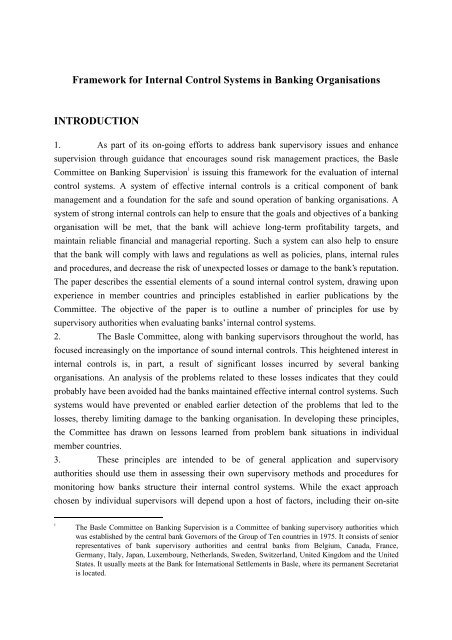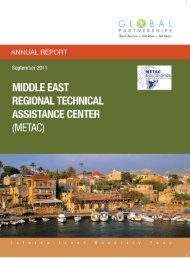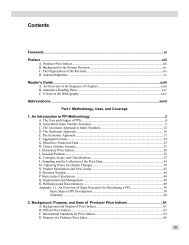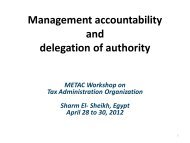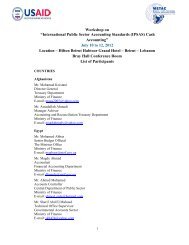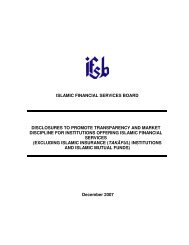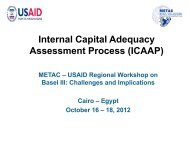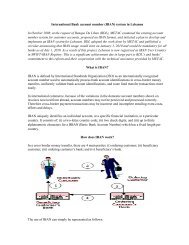Framework for Internal Control Systems in Banking Organisations
Framework for Internal Control Systems in Banking Organisations
Framework for Internal Control Systems in Banking Organisations
Create successful ePaper yourself
Turn your PDF publications into a flip-book with our unique Google optimized e-Paper software.
<strong>Framework</strong> <strong>for</strong> <strong>Internal</strong> <strong>Control</strong> <strong>Systems</strong> <strong>in</strong> Bank<strong>in</strong>g <strong>Organisations</strong><br />
INTRODUCTION<br />
1. As part of its on-go<strong>in</strong>g ef<strong>for</strong>ts to address bank supervisory issues and enhance<br />
supervision through guidance that encourages sound risk management practices, the Basle<br />
Committee on Bank<strong>in</strong>g Supervision 1 is issu<strong>in</strong>g this framework <strong>for</strong> the evaluation of <strong>in</strong>ternal<br />
control systems. A system of effective <strong>in</strong>ternal controls is a critical component of bank<br />
management and a foundation <strong>for</strong> the safe and sound operation of bank<strong>in</strong>g organisations. A<br />
system of strong <strong>in</strong>ternal controls can help to ensure that the goals and objectives of a bank<strong>in</strong>g<br />
organisation will be met, that the bank will achieve long-term profitability targets, and<br />
ma<strong>in</strong>ta<strong>in</strong> reliable f<strong>in</strong>ancial and managerial report<strong>in</strong>g. Such a system can also help to ensure<br />
that the bank will comply with laws and regulations as well as policies, plans, <strong>in</strong>ternal rules<br />
and procedures, and decrease the risk of unexpected losses or damage to the bank’s reputation.<br />
The paper describes the essential elements of a sound <strong>in</strong>ternal control system, draw<strong>in</strong>g upon<br />
experience <strong>in</strong> member countries and pr<strong>in</strong>ciples established <strong>in</strong> earlier publications by the<br />
Committee. The objective of the paper is to outl<strong>in</strong>e a number of pr<strong>in</strong>ciples <strong>for</strong> use by<br />
supervisory authorities when evaluat<strong>in</strong>g banks’ <strong>in</strong>ternal control systems.<br />
2. The Basle Committee, along with bank<strong>in</strong>g supervisors throughout the world, has<br />
focused <strong>in</strong>creas<strong>in</strong>gly on the importance of sound <strong>in</strong>ternal controls. This heightened <strong>in</strong>terest <strong>in</strong><br />
<strong>in</strong>ternal controls is, <strong>in</strong> part, a result of significant losses <strong>in</strong>curred by several bank<strong>in</strong>g<br />
organisations. An analysis of the problems related to these losses <strong>in</strong>dicates that they could<br />
probably have been avoided had the banks ma<strong>in</strong>ta<strong>in</strong>ed effective <strong>in</strong>ternal control systems. Such<br />
systems would have prevented or enabled earlier detection of the problems that led to the<br />
losses, thereby limit<strong>in</strong>g damage to the bank<strong>in</strong>g organisation. In develop<strong>in</strong>g these pr<strong>in</strong>ciples,<br />
the Committee has drawn on lessons learned from problem bank situations <strong>in</strong> <strong>in</strong>dividual<br />
member countries.<br />
3. These pr<strong>in</strong>ciples are <strong>in</strong>tended to be of general application and supervisory<br />
authorities should use them <strong>in</strong> assess<strong>in</strong>g their own supervisory methods and procedures <strong>for</strong><br />
monitor<strong>in</strong>g how banks structure their <strong>in</strong>ternal control systems. While the exact approach<br />
chosen by <strong>in</strong>dividual supervisors will depend upon a host of factors, <strong>in</strong>clud<strong>in</strong>g their on-site<br />
1<br />
The Basle Committee on Bank<strong>in</strong>g Supervision is a Committee of bank<strong>in</strong>g supervisory authorities which<br />
was established by the central bank Governors of the Group of Ten countries <strong>in</strong> 1975. It consists of senior<br />
representatives of bank supervisory authorities and central banks from Belgium, Canada, France,<br />
Germany, Italy, Japan, Luxembourg, Netherlands, Sweden, Switzerland, United K<strong>in</strong>gdom and the United<br />
States. It usually meets at the Bank <strong>for</strong> International Settlements <strong>in</strong> Basle, where its permanent Secretariat<br />
is located.


